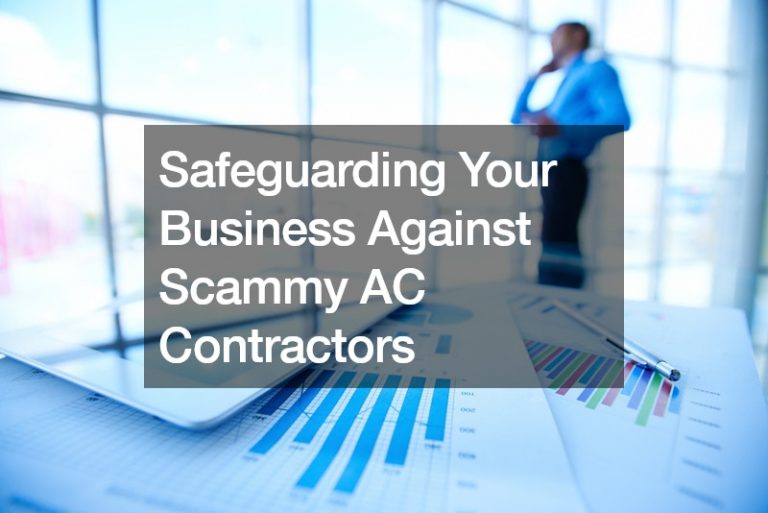Maintaining a comfortable environment within your business premises is paramount for both employee productivity and customer satisfaction. As a small business owner, ensuring that your air conditioning (AC) system operates smoothly is crucial. However, the process of finding reliable air conditioning contractors can sometimes be overwhelming, especially with the prevalence of scammy practices in the industry. To help you navigate through this challenge and protect your business from potential scams, we’ve compiled a comprehensive guide with actionable steps and tips.
Verify Their Licenses and Credentials
Before entrusting your AC system to any contractor, it’s essential to verify their licenses and credentials. A legitimate AC contractor should hold all necessary licenses and accreditations to operate in your state. This not only guarantees their competency but also provides legal protection for your business in case of any issues during the repair or maintenance process.
You can look specifically for the following:
HVAC Contractor License: Most states require HVAC contractors to hold a valid license to perform heating, ventilation, and air conditioning (HVAC) services. This license demonstrates that the contractor has met specific requirements set by the state, such as completing relevant education or training and passing exams to assess their knowledge and skills in HVAC systems.
EPA Certification: The Environmental Protection Agency (EPA) requires HVAC technicians who work with refrigerants to obtain EPA Section 608 certification. This certification ensures that the contractor has been trained to handle refrigerants safely and responsibly, minimizing environmental impact and ensuring compliance with federal regulations.
NATE Certification: The North American Technician Excellence (NATE) certification is a nationally recognized credential for HVAC technicians. Contractors who employ NATE-certified technicians demonstrate their commitment to excellence and professionalism in the industry. NATE certification covers various aspects of HVAC systems, including installation, maintenance, and repair.
State-specific Licenses: In addition to HVAC contractor licenses, some states may have specific licensing requirements for different aspects of HVAC work, such as refrigeration, ductwork installation, or electrical wiring. Contractors should hold any additional licenses required by their state to perform these specialized tasks legally.
Research Past Disciplinary Actions
Take the time to conduct thorough research on the contractor’s background and check for any past disciplinary actions or complaints. Many states offer online resources where you can access this information. By doing your due diligence, you can avoid working with contractors who have a history of unethical or fraudulent behavior, safeguarding your business interests.
Educate Yourself on Contractor Requirements
Familiarize yourself with the specific requirements for AC contractors in your state. Understand the regulations and laws governing HVAC services, including licensing, insurance, and contract agreements. This knowledge empowers you to make informed decisions and ensures compliance with legal obligations, protecting your business from potential liabilities.
Seek Referrals and Online Reputation
Seek recommendations from trusted sources such as other business owners, friends, or neighbors who have experience with AC contractors. Additionally, research the contractor’s online reputation by reviewing reviews and testimonials from previous clients. A positive track record and reputation are indicators of a reliable and trustworthy contractor, providing peace of mind for your business.
Get Multiple Written Estimates
Obtain written estimates from at least three different AC contractors before making a decision. Compare the proposals carefully, considering factors such as pricing, scope of work, and warranties offered. Avoid automatically choosing the lowest bidder, as quality and reliability should take precedence over cost, ensuring a successful outcome for your business.
Insist on Detailed Contracts
Insist on having a detailed contract in writing before any work commences. The contract should outline the agreed-upon scope of work, start and finish dates, pricing, payment terms, and warranties. Having everything documented helps mitigate potential disputes and ensures clear expectations for both parties throughout the project.
Avoid Verbal Agreements
Refrain from relying on verbal agreements and ensure that all guarantees, warranties, and promises are documented in writing. Verbal agreements are challenging to enforce and can lead to misunderstandings or disputes later on. Protect your business interests by ensuring that everything is clearly outlined and agreed upon in writing.
Limit Down Payments and Deposits
Exercise caution when it comes to making upfront payments or deposits. Limit the amount you pay upfront to a reasonable percentage of the total project cost and avoid contractors who demand full payment before any work is completed. This safeguards your investment and provides leverage until the job is satisfactorily completed.
Be Wary of Red Flags
Be vigilant for common red flags that may indicate a scammy AC contractor. These include pressuring you into making immediate decisions, requesting cash payments or using unconventional payment methods, and making unsolicited door-to-door solicitations. Trust your instincts and steer clear of contractors who exhibit such behaviors to protect your business from potential scams.
Finding a reliable and trustworthy AC contractor is essential for maintaining the comfort and functionality of your business premises. By following the actionable steps and tips outlined in this guide, you can avoid falling victim to scammy practices and ensure that your AC system is in good hands, safeguarding your business interests for the long term.
.




